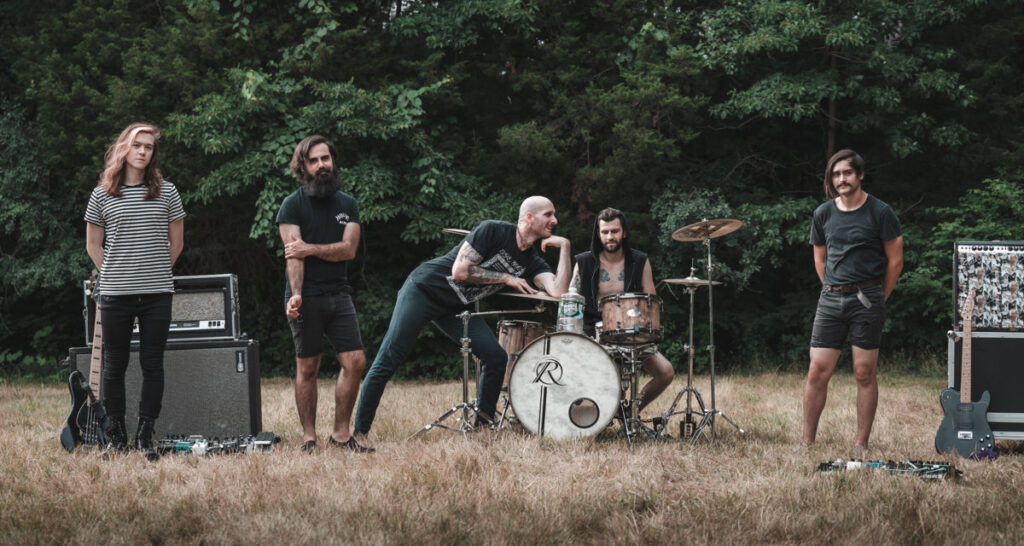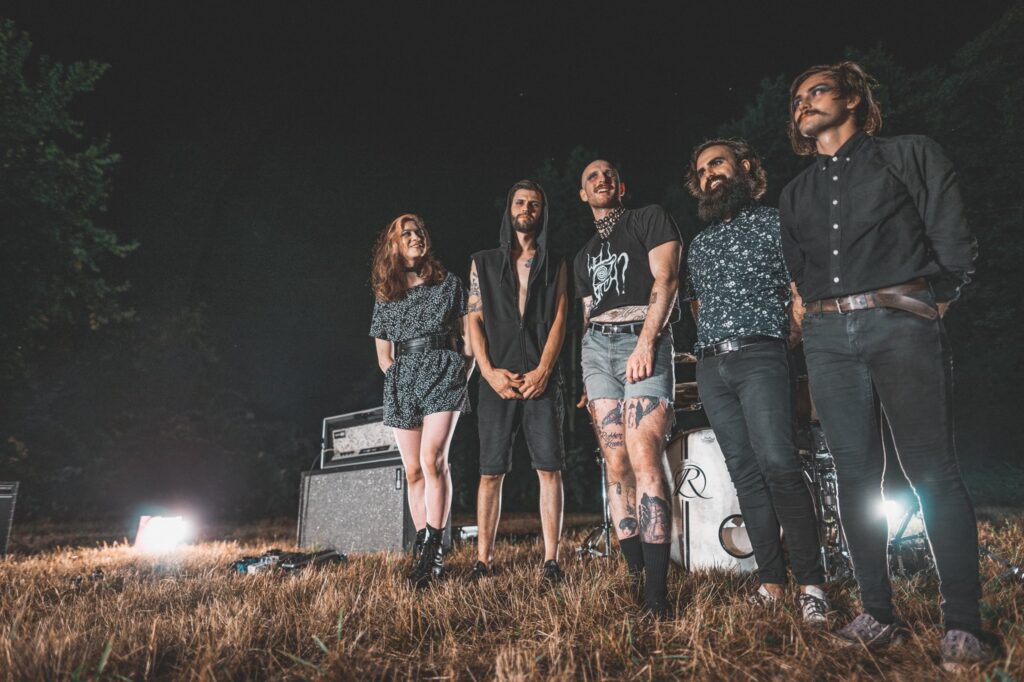
(Photo Credit: Jared Shute)
Dreamwell is quick to talk about how their latest album Modern Grotesque is cursed. “We had a plan in 2018 to finish writing the album that summer,” guitarist Aki McCullough tells us during our call with the band over Zoom. “We were just gonna keep writing and not play too many shows, and be done. It didn’t quite go that way.” Plagued by tumultuous lineup changes, workplace injuries, COVID lockdowns, and label issues, the Providence-based post-hardcore/skramz five-piece’s sophomore album took an arduous four year journey to get to its recent release. Though the road to bring Modern Grotesque to fruition was long and fraught with difficulties, the album itself is an instantly gripping and cathartic experience, and one that makes Dreamwell an emerging band well worth watching.
Composed of McCullough (she/her), vocalist Keziah “KZ” Staska (he/she/they), guitarist Ryan Couitt (they/them), bassist Justin Soares (he/him), and drummer Anthony Montalbano (he/him), Dreamwell first came into form in 2016. “I had just moved to Boston,” McCullough says, “and hadn’t been in any bands in Boston yet.” She came across a post in a Facebook screamo group “looking for a guitarist for a band for fans of Touché Amoré, Pianos Become The Teeth, and Defeater,” and met with the four other members at the time (including the band’s initial vocalist Ramsay Young), who had formed Dreamwell after playing in post-hardcore and pop-punk bands with each other before. What resulted was their 2017 debut album The Distance Grows Fonder, a release written and recorded shortly after the band’s initial meeting.
And though the band had started writing songs for their follow-up and performing them at live shows shortly after that album’s release, Dreamwell quickly found themselves hitting numerous stumbling blocks on the way to completing Modern Grotesque. After Young parted ways with the band following difficulties with songwriting, the group took on another vocalist who “basically just ghosted us,” says Couitt, centering all his time with a different band instead. “It felt like someone was committing to a relationship with you and they’d been cheating the whole time,” McCullough describes. Luckily, Couitt had known Staska from their doom band Lymphoma Twins, and approached them in mid-2019 after Staska had expressed wanting to join the band previously. Staska showed up the next week with vocals already written (“Shocking for a vocalist to have it together,” McCullough and Couitt joke), and the songwriting process for “basically the entire album at that point” was completed “pretty fast.”
When it came to the recording and production of Modern Grotesque, however, Dreamwell still faced several uphill battles to turn their songwriting into a finished record. The problems started during recording sessions in early March 2020, when Montalbano accidentally stabbed himself in the leg at work with a box cutter and had to track drums with an infected wound despite being unable to stand or practice the week before. Thankfully, Montalbano powered through and completed his parts for the album. (“[He’s a] machine,” Couitt remarks in amazement.) That relief didn’t last long, as the pandemic lockdown in March stopped production in its tracks before McCullough or Staska could record their parts. Though McCullough was able to record her parts at her home studio (and narrowly avoided a session with COVID-positive recording engineer Ryan Stack) and Staska was able to provide vocals during a lull in COVID cases in July, Dreamwell hit one more challenge when their label bailed on them a week before the album’s release. Quickly working around that, the band took care of their own promotion, pre-order campaigns, and streaming licensing. “And then the singles disappeared on release day of the album,” Couitt notes as a consequence of label complications. “So that was kind of like the final ‘fuck you’ to the cursed album, because why would anything possibly go smoothly?”
A casual listener unaware of this background might not be able to tell that this much difficulty happened behind the scenes, as Modern Grotesque comes across as a wonderfully assured album of pummeling post-hardcore riffs and piercing screams, with its emotional and sonic intensity rarely relenting. That much is clear from the album’s opening three songs, all naturally segueing into one another despite being written as separate tracks over different periods of time. After a screamed prelude over clean guitars on “What Does It Mean to Live in a Grotesquerie?,” the album drops headfirst into the punchier screamo energy of “Painting Myself a Darker Day,” before guitar feedback whines directly into the foundational drumbeat that introduces the even more frenetic desperation of “Sayaka.” Refining that kind of tracklist flow is something that McCullough says she has an intuition for. “I’ve always been interested in more macro-level songwriting, or album writing, or even discography writing,” she says. “And I’ve always been interested in the idea of grabbing and letting go of the listener’s attention, sonically. I think it’s an interesting variable to play with because [the way] people listen to music is especially different these days.”
That sense of cohesion permeates Staska’s approach toward writing the album’s lyrics as well. Though initially tasked with simply writing lyrics in time for the band to play shows, Staska soon found that his lyrics often returned to the same themes and concepts. “It made me think this could be a good opportunity to not just be writing a bunch of disconnected songs,” she explains. “but instead really have a throughline, and it started to [affect] how I approached the rest of the songs.” That realization ultimately drove them to introduce snippets of lyrics across the record on the album opener, and turned the closer into a hopeful outlook that ties everything together for the characters across the album. What became the unifying lyrical factor of the album — and provided the record with its title — was Staska’s focus on fiction writing in a workshop with a professor who introduced them to Flannery O’Connor. “A lot of these characters she would write were these twisted versions of ideals and characteristics of Southern culture, whether it be their religious elements or their social fabric,” he explains, “showing how they failed to live up to the culture they’ve created for themselves.” Staska became inspired to make their own “modern grotesques” as an exercise toward writing more character-based lyrics, basing this concept on the lack of regionality that comes with living on the Internet and “looking at the broader culture we live as a part of.” What results are lyrics that span from the allegorically visceral gay narrative of “You Dreamt of Me. I Dreamt of a Mountain of Salt” to the direct reflection on abuse of “Plague Father; Vermin Son,” Staska adapting their style to fit what any given song or subject calls for.
It’s the band’s approach toward bringing the instrumentation and lyrics together, however, that makes each heavy, sprawling skramz cut land with thunderous impact. Often developing songs by building off riffs one member would bring in to practice or demo tracks that McCullough had made beforehand, Dreamwell has found that they’ve been honing their approach toward collaborating as a band over the course of Modern Grotesque’s production. McCullough and Couitt often see that dynamic develop between their own playing styles as guitarists, as in a “completely accidental” moment on “Mountain of Salt” where the two play the same riff in different orders. Elsewhere on the album, the band found themselves challenged by the rigorous demands of the music itself. The album’s climactic multi-part title track is one the band unanimously thinks was one of the hardest to pull off, due to the number of riffs and ferocity of blast beats McCullough had written for it — to the point that Couitt jokingly refers to it as a “high post-rock skramz epic.” Staska found their own difficulties in the late album cut “The Lost Ballad of Dominic Anneghi,” with the song demanding she write and vocalize “completely outside of my comfort zone,” almost giving up on the song entirely due to having to “first teach myself new ways of writing that I’ve never done in my 10 years of writing music.”

(Photo Credit: Jared Shute)
With Modern Grotesque out, Dreamwell now find themselves particularly excited about their video for “Mountain of Salt,” which was shot and edited by the band’s photographer Jared Shute, and is due to be released soon. The video was filmed with “an absolutely nothing budget,” with last-minute DIY fixes involving using car headlights for night shooting, as well as drilling and melting a candle into a Bible. As conceptualized by Staska and McCullough, the band aimed to capture their raw energy and passion in performing, while visually capturing the song’s allegorical lyricism about “gay stuff.” To fit that theme, McCullough notes how shooting fell a few months after she started transitioning, and that “it was the first time everyone saw me in anything feminine and with makeup.” Talking about the band’s written plans for the video, Staska adds that there was one note that the band had for themselves above all else: “‘Night scenes: dress gay.’”
With their “cursed album” finally out and catching the ear of new listeners, Dreamwell is already looking forward to performing songs from Modern Grotesque in a live setting once it’s safe to do so again. “Everything that I do musically is with the intention of being live,” Staska says. “I write based on how it feels to perform it physically, so I miss performing the songs basically the way that they were meant to be performed. Also, the live space has always been my one opportunity to be an unhinged maniac.” McCullough is particularly excited to return to performing live for another reason: “I’ve yet to play a show post-transition. Even before, it was one of the few times where I felt super in the zone and super confident and was like, ‘Yeah, this is what I should be doing.’ So I’m ready to just wear my most over-the-top clothes that I can’t really wear in any other setting in public. I’m ready to become too powerful for the universe.”
Modern Grotesque is out now. Stream it below.
